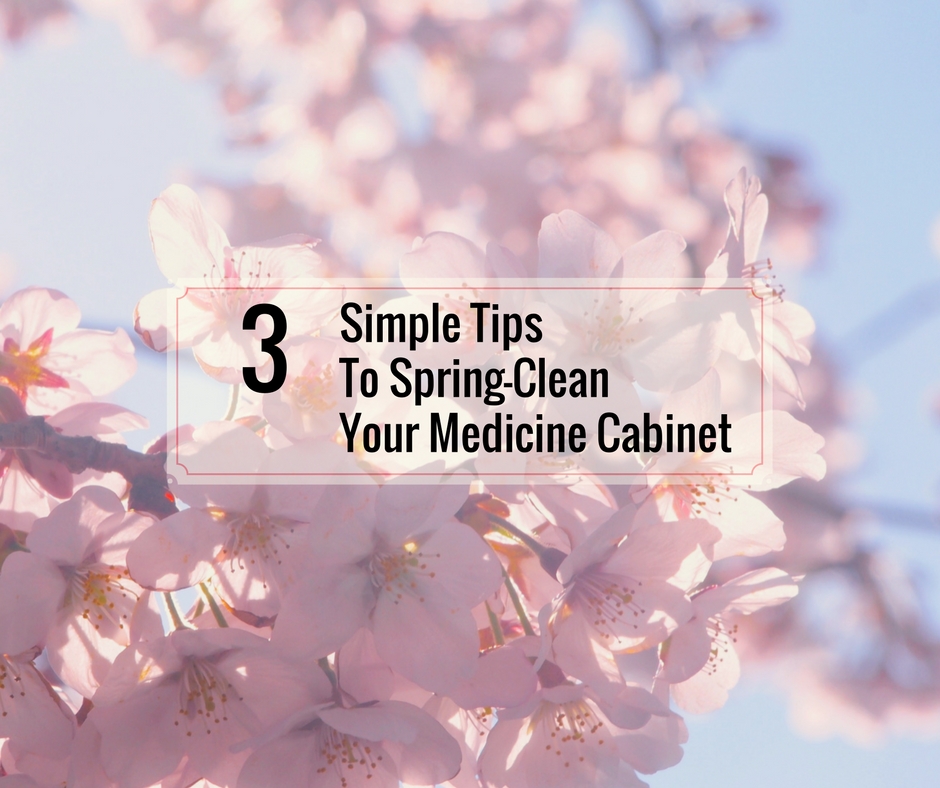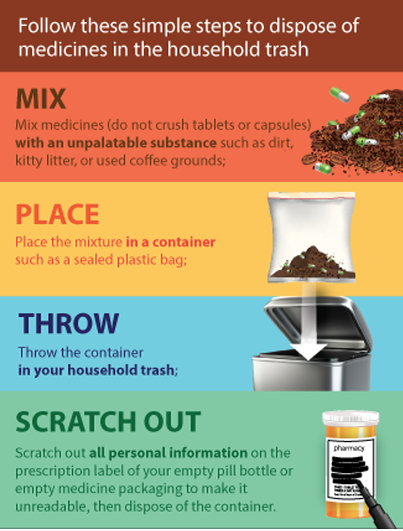
3 Simple Tips to Spring Clean Your Medicine Cabinet

Spring is here and this is the best time of the year to clean up and freshen up your house after a long cold winter. Whether deep cleaning or simply organizing tasks, it is important to include cleaning your medicine cabinet in your spring cleaning list.
Some important reasons for cleaning and organizing your medicine cabinet are:
-
Avoiding health problems from accidentally taking expired medicine
Expired medical products can be less effective or risky due to a change in chemical composition or a decrease in strength. Certain expired medications are at risk of bacterial growth and subpotent antibiotics can fail to treat infections, leading to more serious illnesses and antibiotic resistance.
-
Detering misuse by teenagers and adults
According to a statement by the U.S. Drug Enforcement Administration (DEA), prescription drug abuse in the United States is at the alarming rate, as are the numbers of accidental poisonings and overdoses due to these drugs. Studies show that many abused prescription drugs are obtained from family and friends, usually from the home medicine cabinet.
-
Preventing accidental poisonings of children
According to Center for Disease and Control and Prevention (CDC), every day in the United States, as a result of poisonings, over 300 children aged 0 to 19 are treated in an emergency department, with two children dying. Medication dosing mistakes and unsupervised ingestions are common ways that children are poisoned. Additionally, everyday items in your home such as household cleaners and medicines can be poisonous to children as well.
Here are some tips to get you started in decluttering and organizing your medicine cabinet:
1. Grouping
Separate everything in your medicine cabinet into clearly labeled categories such as a supplements and vitamins category, prescription medications category, nonprescription (over the counter) category, and first aid category. This also includes ointments, either prescribed or over the counter.
2. Checking the expiration dates
Check all the expiration dates of all medications and ointments and discard any expired medications and ointments. The expiration date can be found printed on the label or stamped onto the bottle or carton, sometimes following “EXP.” It is important to know and stick to the expiration date on your medicine. As mentioned previously, using expired medical products is risky and possibly harmful to your health.
It is also important to discard unidentified medications and vitamins that have no label, have changed color, texture, or smell, stick together, are harder or softer than normal, or are cracked or chipped, even if they have not expired.
What to do with expired meds?
First, read the medicine’s label and follow any specific disposal instructions that may be included. A drug take-back program, such as the National Prescription Drug Take-Back Day coordinated by the U.S. Drug Enforcement Administration (DEA), if available, is the preferred way to dispose of expired, unwanted, or unused medicine. The next Take Back Day is on April 28th, 2018. However, you still can dispose of prescription medications before the next Take Back Day by locating and contacting a year-round authorized collector in your area.
For safety reasons, the FDA recommends that a few selected medicines disposed of by flushing down the sink or toilet. Accidental exposure to these medicines could be harmful or sometimes deadly, even in a single dose, if they are used by someone other than the person the medicine was prescribed for. Flushing these medicines down the sink or toilet removes this risk from the home.
If no medicine take-back programs or DEA-authorized collectors are available in your area, and there are no specific disposal instructions on the label, such as flushing as described above, you can follow these simple steps to dispose of most medicines in the household trash:

- Mix medicines (do not crush tablets or capsules) with an unpalatable substance such as dirt, kitty litter, or used coffee grounds
- Place the mixture in a container such as a sealed plastic bag
- Throw the container in your household trash
- Scratch out all personal information on the prescription label of your empty pill bottle or empty medicine packaging to make it unreadable, then dispose of the container.
3. Store Properly
While it is common to store your medicines in a bathroom cabinet, factors such as heat, air, light, and moisture might decrease the effectiveness of your medications. Where you store your medicine can affect how well it works and proper storage is one way to help make sure your medicines will remain safe and effective up to their expiration date.
Here are tips to take care of your medicine:
- Always keep medicine in its original container.
- Be sure to read the label to see if there are specific storage instructions for your medicine or ask your pharmacist about any specific storage instructions if it is not listed on the label. Certain medicines need to be stored in the refrigerator and others cannot be exposed to high temperatures.
- Store your medicines in a cool, dry place. For example, store it in your dresser drawer or a kitchen cabinet away from the stove, sink, and any hot appliances. You can also store medicine in a storage box, on a shelf, or in a closet.
- Avoid storing your medicine in a bathroom cabinet, the heat and moisture from your shower, bath, and sink may damage your medicine. Your medicines can become less potent, or they may go bad before the expiration date.
- Pills and capsules are easily damaged by heat and moisture. Aspirin pills break down into vinegar and salicylic acid, which can irritate the stomach.
- Discard the cotton ball out of the medicine bottle. The cotton ball pulls moisture into the bottle.
Keep children safe:
- Always store your medicine out of reach and out of sight of children.
- Never leave medicines out on a kitchen counter or at a sick child’s bedside, even if you have to give the medicine again in a few hours.
- Store your medicine in a cabinet with a child-lock.
Source:
- FDA
- DEA
- Medlineplus
- CDC
Read more:
- Fentanyl Patch Can Be Deadly to Children
- List of medicine that should be flushed down a toilet
- DEA Take Back Day program
Picture Credit:
- FDA


Most Commented